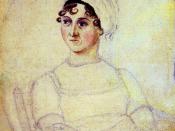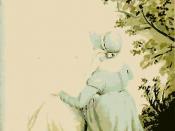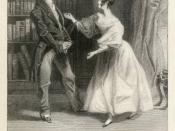If Elizabeth, when Mr. Darcy gave her the letter, did not expect it to contain a renewal of his offers, she had formed no expectation at all of its contents. But such as they were, it may well be supposed how eagerly she went through them, and what a contrariety of emotion they excited. Her feelings as she read were scarcely to be defined. With amazement did she first understand that he believed any apology to be in his power; and steadfastly was she persuaded that he could have no explanation to give, which a just sense of shame would not conceal. With a strong prejudice against every thing he might say, she began his account of what had happened at Netherfield. She read, with an eagerness which hardly left her power of comprehension, and from impatience of knowing what the next sentence might bring, was incapable of attending to the sense of the one before her eyes.
His belief of her sister's insensibility, she instantly resolved to be false, and his account of the real, the worst objections to the match, made her too angry to have any wish of doing him justice. He expressed no regret for what he had done which satisfied her; his style was not penitent, but haughty. It was all pride and insolence.
But when this subject was succeeded by his account of Mr. Wickham, when she read with somewhat clearer attention, a relation of events, which, if true, must overthrow every cherished opinion of his worth, and which bore so alarming an affinity to his own history of himself, her feelings were yet more acutely painful and more difficult of definition. Astonishment, apprehension, and even horror, oppressed her. She wished to discredit it entirely, repeatedly exclaiming "This must be false! This cannot be!...


